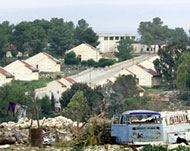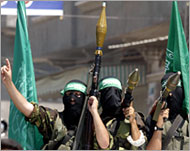Israeli settlers proliferate in West Bank
The population in Israel’s West Bank settlements has grown by more than 12,000 during the past year, reinforcing Prime Minister Ariel Sharon’s goal of strengthening large settlement blocs while withdrawing from the Gaza Strip.

An Israeli interior ministry spokesman said on Friday that the settler population in the West Bank grew to about 246,000 in June, an increase of 12,800, or 5%, over the previous year.
Gilad Heiman added that the increase stemmed from new births and an influx of new residents, though he could not provide a breakdown.
The latest figures drew new criticism from Palestinian officials, who accused Israel of undermining prospects for peace.
Israel this week completed the evacuation of all 21 Jewish settlements in Gaza and four isolated enclaves in the West Bank.
Sharon has repeatedly said the withdrawal would help consolidate Israel’s control over large settlement blocs in the West Bank, where the vast majority of Jewish settlers live.
New figures from the Interior Ministry show high growth in these blocs.
 |
|
Official figures show increased |
Many families are attracted to the settlements because of their lower housing prices and proximity to the large cities of Jerusalem and Tel Aviv.
Dozens of families uprooted from Gaza this month have been given temporary housing in West Bank settlements, though it remains unclear how many want to remain permanently.
Settlements expansion
The Maariv daily said the populations of two large ultra-Orthodox settlements near Jerusalem, Betar Illit and Kiryat Sefer, together grew by about 5500 over the past year. Maaleh Adumim, the largest settlement, grew by about
1000 people, Heiman said.
Zalman Shoval, an adviser to Sharon, said the Israeli public widely supports expansion of the settlement blocs.
“We don’t regard the situation of those large settlement blocs … any differently from any other place in Israel,” he said.
Shoval said the US has supported this view.
In May 2004, President George Bush said a final settlement with the Palestinians would have to recognise “new realities” on the ground, though he also has criticised the continued expansion of settlements.
Palestinian reaction
|
“Settlements and peace are two parallels that won’t meet” |
The Palestinians claim all of the West Bank as part of a future independent state, with east Jerusalem as their capital.
They say the continued expansion of settlements will make it impossible to establish a viable state.
“Settlements and peace are two parallels that won’t meet,” said Palestinian peace negotiator Saeb Erekat.
“I hope their choice will be peace, not settlements.”
Earlier this week, Israel said it had issued land-seizure orders to confiscate private Palestinian property around Maaleh Adumim for construction of a massive separation barrier.
The barrier will go around the settlement, located about eight km east of Jerusalem, effectively annexing the land.
Israel plans to build about 3500 housing units in the area between Maaleh Adumim and Jerusalem, though officials say the project is years away.
The Palestinians say the construction would cut off access to Jerusalem and cut the West Bank into two.
Hamas celebration
 |
|
Hamas fighters during a mass |
Also on Friday, Hamas held a large rally in Gaza to celebrate the Israeli pullout that comprised about 5000 people, including armed men carrying anti-tank rockets, rifles and submachine guns.
The group repeated its calls to avenge an Israeli arrest raid that killed five Palestinians in the West Bank this week.
“The retaliation is coming and the blood of our beloved people will not go in vain. We will be happy to hear the news when our fighters succeed and get revenge for their blood,” said Nizar Rayan, a Hamas leader in the Jebalya refugee camp.